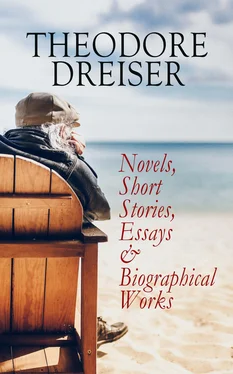Drouet had seen this play some time in the past.
“That’s it,” he said; “that’s a fine play. It will go all right. You ought to make a lot of money out of that.”
“We think we’ll do very well,” Mr. Quincel replied. “Don’t you forget now,” he concluded, Drouet showing signs of restlessness; “some young woman to take the part of Laura.”
“Sure, I’ll attend to it.”
He moved away, forgetting almost all about it the moment Mr. Quincel had ceased talking. He had not even thought to ask the time or place.
Drouet was reminded of his promise a day or two later by the receipt of a letter announcing that the first rehearsal was set for the following Friday evening, and urging him to kindly forward the young lady’s address at once, in order that the part might be delivered to her.
“Now, who the deuce do I know?” asked the drummer reflectively, scratching his rosy ear. “I don’t know any one that knows anything about amateur theatricals.”
He went over in memory the names of a number of women he knew, and finally fixed on one, largely because of the convenient location of her home on the West Side, and promised himself that as he came out that evening he would see her. When, however, he started west on the car he forgot, and was only reminded of his delinquency by an item in the “Evening News” – a small three-line affair under the head of Secret Society Notes – which stated the Custer Lodge of the Order of Elks would give a theatrical performance in Avery Hall on the 16th, when “Under the Gaslight” would be produced.
“George!” exclaimed Drouet, “I forgot that.”
“What?” inquired Carrie.
They were at their little table in the room which might have been used for a kitchen, where Carrie occasionally served a meal. To-night the fancy had caught her, and the little table was spread with a pleasing repast.
“Why, my lodge entertainment. They’re going to give a play, and they wanted me to get them some young lady to take a part.”
“What is it they’re going to play?”
“‘Under the Gaslight.’”
“When?”
“On the 16th.”
“Well, why don’t you?” asked Carrie.
“I don’t know any one,” he replied.
Suddenly he looked up.
“Say,” he said, “how would you like to take the part?”
“Me?” said Carrie. “I can’t act.”
“How do you know?” questioned Drouet reflectively.
“Because,” answered Carrie, “I never did.”
Nevertheless, she was pleased to think he would ask. Her eyes brightened, for if there was anything that enlisted her sympathies it was the art of the stage. True to his nature, Drouet clung to this idea as an easy way out.
“That’s nothing. You can act all you have to down there.”
“No, I can’t,” said Carrie weakly, very much drawn toward the proposition and yet fearful.
“Yes, you can. Now, why don’t you do it? They need some one, and it will be lots of fun for you.”
“Oh, no, it won’t,” said Carrie seriously.
“You’d like that. I know you would. I’ve seen you dancing around here and giving imitations and that’s why I asked you. You’re clever enough, all right.”
“No, I’m not,” said Carrie shyly.
“Now, I’ll tell you what you do. You go down and see about it. It’ll be fun for you. The rest of the company isn’t going to be any good. They haven’t any experience. What do they know about theatricals?”
He frowned as he thought of their ignorance.
“Hand me the coffee,” he added.
“I don’t believe I could act, Charlie,” Carrie went on pettishly. “You don’t think I could, do you?”
“Sure. Out o’ sight. I bet you make a hit. Now you want to go, I know you do. I knew it when I came home. That’s why I asked you.”
“What is the play, did you say?”
“‘Under the Gaslight.’”
“What part would they want me to take?”
“Oh, one of the heroines – I don’t know.”
“What sort of a play is it?”
“Well,” said Drouet, whose memory for such things was not the best, “it’s about a girl who gets kidnapped by a couple of crooks – a man and a woman that live in the slums. She had some money or something and they wanted to get it. I don’t know now how it did go exactly.”
“Don’t you know what part I would have to take?”
“No, I don’t, to tell the truth.” He thought a moment. “Yes, I do, too. Laura, that’s the thing – you’re to be Laura.”
“And you can’t remember what the part is like?”
“To save me, Cad, I can’t,” he answered. “I ought to, too; I’ve seen the play enough. There’s a girl in it that was stolen when she was an infant – was picked off the street or something – and she’s the one that’s hounded by the two old criminals I was telling you about.” He stopped with a mouthful of pie poised on a fork before his face. “She comes very near getting drowned – no, that’s not it. I’ll tell you what I’ll do,” he concluded hopelessly, “I’ll get you the book. I can’t remember now for the life of me.”
“Well, I don’t know,” said Carrie, when he had concluded, her interest and desire to shine dramatically struggling with her timidity for the mastery. “I might go if you thought I’d do all right.”
“Of course, you’ll do,” said Drouet, who, in his efforts to enthuse Carrie, had interested himself. “Do you think I’d come home here and urge you to do something that I didn’t think you would make a success of? You can act all right. It’ll be good for you.”
“When must I go?” said Carrie, reflectively.
“The first rehearsal is Friday night. I’ll get the part for you to-night.”
“All right,” said Carrie resignedly, “I’ll do it, but if I make a failure now it’s your fault.”
“You won’t fail,” assured Drouet. “Just act as you do around here. Be natural. You’re all right. I’ve often thought you’d make a corking good actress.”
“Did you really?” asked Carrie.
“That’s right,” said the drummer.
He little knew as he went out of the door that night what a secret flame he had kindled in the bosom of the girl he left behind. Carrie was possessed of that sympathetic, impressionable nature which, ever in the most developed form, has been the glory of the drama. She was created with that passivity of soul which is always the mirror of the active world. She possessed an innate taste for imitation and no small ability. Even without practice, she could sometimes restore dramatic situations she had witnessed by re-creating, before her mirror, the expressions of the various faces taking part in the scene. She loved to modulate her voice after the conventional manner of the distressed heroine, and repeat such pathetic fragments as appealed most to her sympathies. Of late, seeing the airy grace of the ingenue in several well-constructed plays, she had been moved to secretly imitate it, and many were the little movements and expressions of the body in which she indulged from time to time in the privacy of her chamber. On several occasions, when Drouet had caught her admiring herself, as he imagined, in the mirror, she was doing nothing more than recalling some little grace of the mouth or the eyes which she had witnessed in another. Under his airy accusation she mistook this for vanity and accepted the blame with a faint sense of error, though, as a matter of fact, it was nothing more than the first subtle outcroppings of an artistic nature, endeavouring to re-create the perfect likeness of some phase of beauty which appealed to her. In such feeble tendencies, be it known, such outworking of desire to reproduce life, lies the basis of all dramatic art.
Now, when Carrie heard Drouet’s laudatory opinion of her dramatic ability, her body tingled with satisfaction. Like the flame which welds the loosened particles into a solid mass, his words united those floating wisps of feeling which she had felt, but never believed, concerning her possible ability, and made them into a gaudy shred of hope. Like all human beings, she had a touch of vanity. She felt that she could do things if she only had a chance. How often had she looked at the well-dressed actresses on the stage and wondered how she would look, how delightful she would feel if only she were in their place. The glamour, the tense situation, the fine clothes, the applause, these had lured her until she felt that she, too, could act – that she, too, could compel acknowledgment of power. Now she was told that she really could – that little things she had done about the house had made even him feel her power. It was a delightful sensation while it lasted.
Читать дальше












